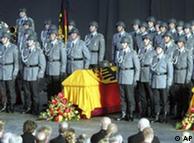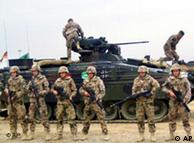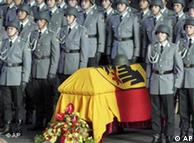Germans Divided on How to Honor Fallen Soldiers
Less than a week after three German soldiers were killed in Afghanistan, debate is heating up over a monument to honor the country's post-World War II armed forces members who died while on duty at home and abroad.
Since the establishment of the German army in the 1950s, more than 2,600 soldiers have died in accidents, maneuvers or peacekeeping missions at home and abroad. On May 19, the tally rose further after a suicide bomb killed three soldiers in Kunduz, Afghanistan.
The deaths of the soldiers, which brought the German fatality toll since the Bundeswehr deployed to Afghanistan in 2002 to a total of 21, has not only generated hefty debate in parliament over the security of the troops in Afghanistan, but on how to memorialize those who die while serving their country.
While there are little reservations about building a memorial to honor soldiers killed on duty in the country's post-war armed forces, discussion has centered on the planned location for such a monument.
 Bildunterschrift: A memorial service was held for the fallen soldiers on Wednesday
Bildunterschrift: A memorial service was held for the fallen soldiers on Wednesday
German Defense Minister Franz Josef Jung, who has long harbored plans to honor the fallen soldiers, said the memorial would be erected within the ministry's premises in Berlin.
Thomas Raabe, spokesman for the defense ministry, said on Thursday that the memorial would be located within the Bendlerblock compound, the seat of Germany's defense ministry in Berlin. "There will be no changes to that," he added.
A public memorial?
But not everyone agrees with locating the memorial within a high-security tract not easily accessible to the general public. The representative for the armed forces in the German parliament, Reinhold Robbe, said the majority of soldiers would prefer to see the monument built on a prominent site in Berlin.
Speaking on the television station RTL, Robbe said the monument and its location needed to make clear to all who see it that the Bundeswehr is a "parliament's army."
The recent fatalities in Afghanistan have shown "just how dangerous the job of a soldier is," and that the soldiers serve "in the name of Germany," Robbe added.
 Bildunterschrift: Großansicht des Bildes mit der Bildunterschrift: More than 3,000 German troops are stationed in Afghanistan
Bildunterschrift: Großansicht des Bildes mit der Bildunterschrift: More than 3,000 German troops are stationed in Afghanistan
The head of the cross-party parliamentary committee for cultural affairs, Hans-Joachim Otto, told Deutsche Welle it was "highly unfortunate that the defense ministry treats the matter of the memorial as its private business."
"The Bundeswehr is a conscription-based army and hence an army of the people. Bundeswehr missions are decided upon in parliament and not in the defense ministry," he said, adding that as such a more public location would be more in keeping with the nature of Germany's armed forces.
More than a wreath depository
Peter Steinbach, the head of Berlin's German Resistance Memorial Site, also argued against placing the monument behind a closed-off gate at the defense ministry. Such a memorial belongs within view of the public, he said on German public radio. Otherwise, it risks becoming simply a "depository for wreaths."
With a view to similar memorials in other countries, Steinbach said, "No one would ever have suggested that the Vietnam memorial in the United Sites be built within the Pentagon's courtyard."
Chancellor Angela Merkel, who in February had suggested a more public location closer to the Reichstag as a reminder to the role of parliament in deploying the armed forces, endorsed the ministry's proposal for erecting the memorial within the Bendlerblock compound. Her spokesman Ulrich Wilhelm said Thursday she sees eye-to-eye with the defense minister and that details will be presented within due time.
Despite the ongoing debate, Jung is expected to lay the cornerstone for the memorial later this year.

Comments